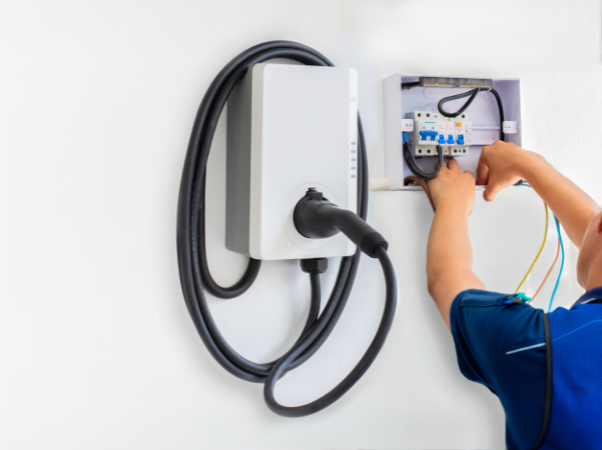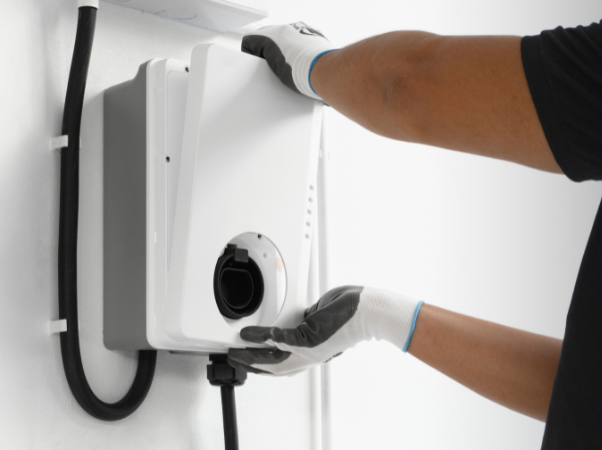EV Chargers Homeowner Guide
What are EV Chargers?
The UK is banning sales of all petrol and diesel vehicles by 2030, and plug-in hybrids from 2035. Instead, electric vehicles offer an efficient, renewable energy-compatible transport alternative.
Charging an electric vehicle (EV) battery takes longer than simply filling a car up with fuel. Because of this, EV chargers can be installed at home to charge electric vehicles in a cheap and convenient way.

The long term economic and ecological benefits of owning an EV, as well as the forthcoming petrol and diesel ban, has caused electric vehicle sales to skyrocket.
EV drivers can save around £1,000 annually (based on an 8,000 per year mileage) on fuel and maintenance costs alone, compared to drivers with petrol or diesel powered vehicles - making them a tempting long-term investment for consumers.
Naturally, those who buy EVs want an efficient and convenient way to charge them, meaning EV chargers are more popular than ever, too. Our experts are here to help you pick the best EV charger for your home or business.
Can you charge an EV with a normal plug?
Technically you can do this - and some people with EVs do - however, in reality, you probably won’t want to.
A regular 2.4kW three-pin wall socket will trickle-charge the average EV battery to full in around 30 hours. This isn’t convenient for most people, so EV buyers tend to opt for a more powerful EV wallbox charger instead.
Can I install an EV Charger at home?
You can install EV chargers on any privately-owned off-road parking, such as on your driveway or in a garage. You’ll typically need a nearby wall or building to fit a wallbox charger, and a charging cable long enough to reach from the wall charger to your desired parking space.

How long does it take to use an EV Charger?
EV charging is getting quicker all the time, as EV batteries and power delivery technology develops.
Currently, ultra-rapid chargers (22kW - 100kW+) can refill an average EV battery to 80% capacity in just 40 minutes (depending on the EV you own). Expect regular EV chargers to take a few hours to fully recharge your car batteries.
What home EV Chargers are available?
At this point, you might be asking what the best electric car charger available might be. The most common choice for UK households is a 7.4kW charger, which will charge a typical 60kWh battery in around 8 hours. This is ideal for those who like to leave their car plugged in and charging overnight.
Even a cost-saving, low-power 3.6kW EV charger will charge an EV much faster than a wall socket. This could be the best route for you if you’re working with a tight budget, or if you don’t require your car to be fully charged every day.
Which EV Charger is fastest?
Superfast 22kW to 100kW+ chargers are also available and are becoming more popular as battery technology and capacity improves. Unfortunately, some EVs are unable to charge that fast, meaning the extra power isn’t necessary. It’s important to check the maximum charge rate of your EV to help make an informed decision on the charger you buy.
Keep in mind that EV chargers that are 22kW or faster will require a three-phase connection to deliver the high charging speeds.
Can EV Chargers get wet?
Yes - all EV chargers are required to be fully waterproof. In addition, EV cables and charging ports are designed to be fully weather-safe - providing users with total peace of mind come rain or shine.

What’s a three-phase connection?
Most homes in the UK are powered by a single-phase connection - whereas others are powered by a three-phase connection.
- A single-phase connection uses one live wire to deliver electricity.
- A three-phase connection utilises three live wires, meaning you could connect to all three for greater charging power.
Unfortunately, most UK homes have a single-phase connection right now. However, if you’re looking to install an ultra-fast charger, you may be able to upgrade to a three-phase connection by contacting your energy supplier.
Do EV Chargers need surge protection?
Whilst not strictly necessary, the EE team does recommend an SPD (surge protection device) installed in order to protect your EV charger.
SPD’s are usually fitted in your fuse box or consumer unit to protect your EV charger (and other electronic devices) from damage in the event of a power surge.
Do EV Chargers increase home value?
As the 2030 petrol/diesel ban draws ever closer, home buyers (especially those who already own EVs) will place greater value on homes with EV charging already installed and ready-to-go. This means an EV charger is likely to increase the overall value of your home.
Do all EVs use the same plug?
Since 2014, it has been mandatory for electric vehicles to use the same ‘Type 2’ connector socket.
Older, pre-2014 vehicles may use the differently shaped ‘Type 1’ connector - however even if you own an older EV, we’d recommend future-proofing your EV charger by installing one with a type 2 connector - especially since type 2 to type 1 adaptors are available.

If you’re looking to future-proof your home or business in time for the upcoming petrol and diesel ban, get in touch with the Energy Efficiency team at City Plumbing who can help you choose the best EV charger for your needs.



